Library
All resources
1661 – 1680 of 2421 results

Cash and Markets In The WASH Sector
Report
Market based programming is increasingly heralded as having a critical place in the future of humanitarian programming. The proposed benefits of working through existing market systems include improvements to speed, efficiency and effectiveness of programming and increased beneficiary dignity and...
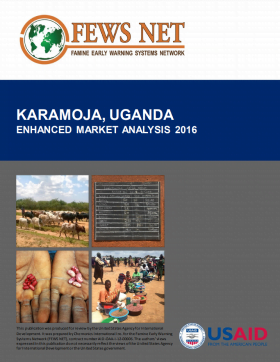
Karamoja, Uganda: Enhanced Market Analysis
Report
The Market Fundamentals reports serves as starting points for providing efficient and effective market-based response decision support for both emergency and development programs in Karamoja Region of Uganda. It examines the appropriateness and feasibility of modality response options for the region.

Prepaid Card Products For Humanitarian Programs: Actors, Insights & Recommendations
Guidelines and Tools
Today, over 130 million people need humanitarian support to survive. Fortunately, new tools such as prepaid cards allow us to respond to these needs with increasing flexibility and efficiency. Today’s leading humanitarian agencies are increasing their use of prepaid cards in places like Jordan, the...
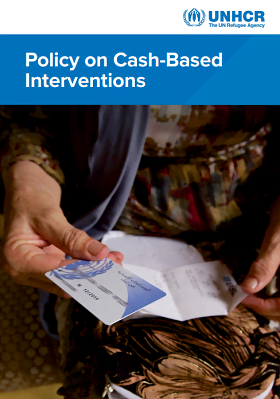
Policy on Cash-Based Interventions
Report
UNHCR’s Policy on Cash-Based Interventions (CBIs) is introduced herewith to expand and systematise the use of CBIs as a modality of assistance and service delivery across the organization and its operations worldwide. The Policy reconfirms UNHCR’s commitment to the increased use of CBIs and sets out...

Labour Market Analysis in Humanitarian Contexts. A practitioner’s guide
Guidelines and Tools
The world and the scale of complex crises are rapidly changing, thus calling for new tools and fresh approaches. This guide aims to help humanitarians conduct better labour market analyses (LMA) to inform the design and delivery of livelihoods and market strengthening programmes in emergency crisis and...
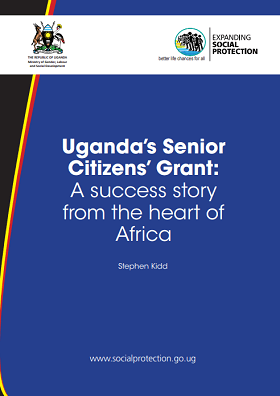
Uganda’s Senior Citizens’ Grant: A success story from the heart of Africa
Report
Since 2011, a pilot universal old age pension – known as the Senior Citizens’ Grant (SCG) – has been implemented in Uganda. By 2016, there were 125,000 beneficiaries. A number of studies have demonstrated that the scheme has had significant benefits. Despite the general economic situation worsening...
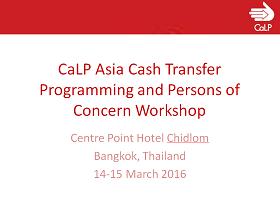
The CALP Network Module 2 – CTP Fundamentals
Report
Cash transfer programming is one form of humanitarian response, which can be used to meet basic needs and/or protect, establish or re-establish livelihoods.

Food Security Cluster Coordinator Cash Transfer Briefing Package
Report
The gFSC aims to contribute actively to provide guidance and tools for national food security clusters to adequately coordinate cash interventions among cluster/sector partners and to ensure equally and consistently consideration of cash alongside other forms of humanitarian assistance in the food...
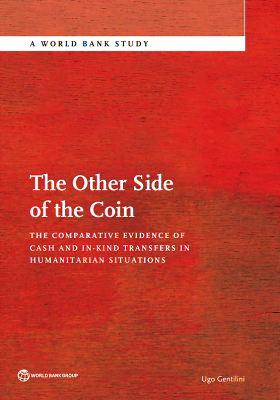
The Other Side of the Coin. The comparative evidence of Cash and in kind transfers in humanitarian situations
Report
This paper reviews the existing evidence on the performance of alternative transfer modalities across humanitarian sectors, including cash transfers, vouchers,and in-kind assistance (food and non-food). These were assessed in relation to food security, nutrition, livelihoods, health, education, and...
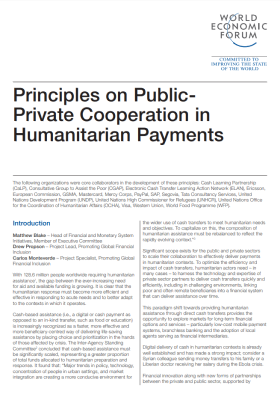
Principles on Public-Private Cooperation in Humanitarian Payments
Guidelines and Tools
E-payments can make the delivery of cash disbursements more secure, cost- effective, faster and more convenient. In the context of humanitarian crises, digital payments offer recipients choice and can help stimulate the local economy. To fully realize the benefits of new technologies and achieve scale,...

Appropriateness and Impact of Cash Grants Distribution in Eastern Ukraine
Case Study
This programming note assesses the appropriateness and impact of cash grants distribution in Eastern Ukraine. Key findings Distribution of cash grants of US$250 – US$900 via bank transfer allowed beneficiaries to purchase or pay for a wide variety of items or services, including food, medication or...
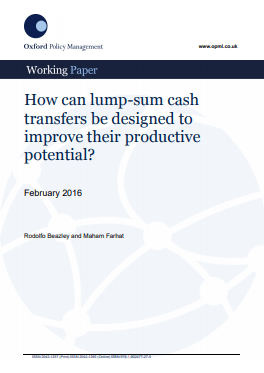
How can lump-sum cash transfers be designed to improve their productive potential?
Presentation
Cash transfer programmes are one of the most popular welfare policies in the developing world and are also backed by a large and rigorous evidence base. Besides the effects on consumption and human capital, the productive impact of cash transfers has been increasingly scrutinised. Despite the fact that...

Afghanistan Emergency Response Mechanism (ERM)
Report
The Afghanistan Emergency Response Mechanism (ERM) was selected as a case study to illustrate the ‘alliance’ form of inter-agency collaboration for sector-focused cash assistance, with semi-formal relationships and separate funding flows between members. It is distinctive from other cases in that cash...

Terms of Reference Geneva-based Cash Working Group – January 2016
Report
Terms of Reference Geneva-based Cash Working Group – January 2016

DFID Shock-Responsive Social Protection Systems research: Literature review
Report
DFID has commissioned research into Shock-Responsive Social Protection systems, to further understand the nature of the interaction between social protection, humanitarian and disaster risk management systems and ways in which long-term social protection systems can be scaled up to
provide support in...

Can E-transfers Promote Financial Inclusion in Emergencies: A Case Study from Bangladesh
Report
The Electronic Cash Transfer Learning Action Network (ELAN) launched research to build an evidence base around connecting emergency electronic transfer (e-transfer) recipients with additional financial services. They wanted to learn if, when, and how e-transfers can promote sustained uptake and use...
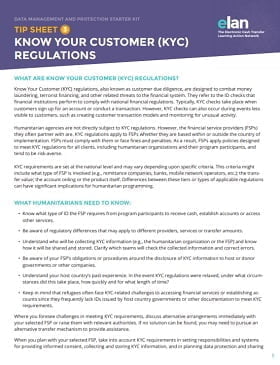
Data management and protection starter kit: Tip sheet 3: Know your customer (KYC) Regulations
Guidelines and Tools
Know Your Customer (KYC) regulations, also known as customer due diligence, are designed to combat money laundering, terrorist financing, and other related threats to the financial system. They refer to the ID checks that financial institutions perform to comply with national financial regulations....

Cash/Food. A Comparative analysis of the effectiveness of food assistance modalities in refugee settlements
Report
A comparative analysis of the effectiveness of food and cash assistance modalities for household food security in refugee settlements

Market Analysis and Outcome/Impact Measurement in Cash Transfer Programming in the WaSH and Shelter Sectors in Sudden Onset Disasters
Report
Over the past five years, cash transfer programming has become an increasingly popular modality of humanitarian intervention. Recently, unconditional and unrestricted MPGs have been increasingly championed as a default modality, based on evidence collected by organisations such as the...
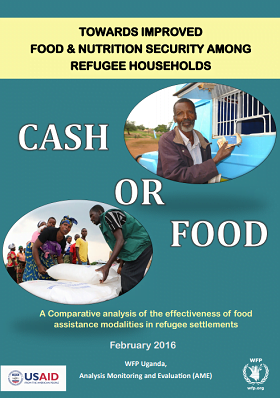
Cash or Food A Comparative analysis of the effectiveness of food assistance modalities in refugee settlements
Report
A comparative analysis on the effective of food and cash transfer modalities for household food security in refugee settlements in Uganda.